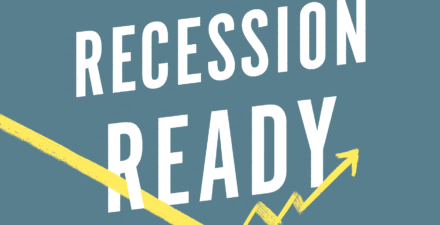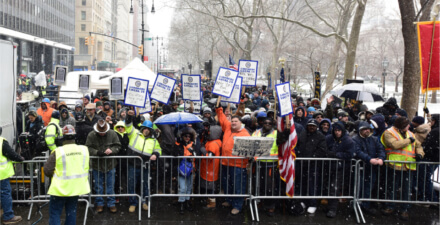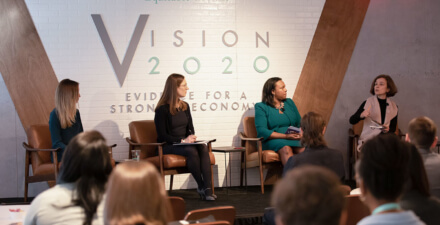Brad DeLong: Worthy reads on equitable growth, December 7–13, 2019
Worthy reads from Equitable Growth:
- New Equitable Growth hire Claudia Sahm has her very own way to tell policymakers when the economy has entered a recession. See the “Sahm Rule Recession Indicator” published by the Federal Reserve Bank of St. Louis, alongside her explanation of the rule from earlier this year. Her rule is “[triggered by] a 0.5 percentage point increase or more in the three-month moving average of the unemployment rate relative to its low in the prior 12 months.” And when it triggers, the time is right to get stimulus out to households, business, and local governments.
- Michael Kades also has indicators for the state of U.S. federal antitrust enforcement. Boy, does he have indicators! Read “The State of U.S. Federal Antitrust Enforcement,” in which he writes: “Criminal antitrust filings have fallen to historic lows … Merger enforcement actions have not kept pace with increased merger filings … Civil nonmerger actions have fallen … U.S. antitrust enforcement resources have fallen … U.S. GDP growth has outpaced growth in antitrust appropriations.”
- Those of us who graduated from college in 1982 had some scarring from the 1982-trough recession, but not nearly as much as today’s young workers. Read Jesse Rothstein, “Great Recession’s ‘Lost Generation’ Shows Importance of Policies to Ease Next Downturn,” in which he writes: “Young college graduates in the Great Recession of 2007–2009… [experienced] damage … [that will last] throughout their careers … Workers from these cohorts saw their annual employment rates drop by 2 percentage points to 4 percentage points per year, relative to older workers in the same labor market. Those who were established in the workforce by the beginning of the recession—those who graduated college in 2005 and earlier—essentially returned to prerecession levels of employment by 2014. But those who entered after 2005 have not; their employment rates remain depressed even as the overall market has recovered.”
Worthy reads not from Equitable Growth:
- Kim Clausing’s Open: The Progressive Case for Free Trade, Immigration, and Global Capital is high on my list for very good policy books of the past year. Attempts to achieve social and egalitarian goals by closing off the international economy comes at an extremely heavy price. Clausing is very convincing that that price is rarely worth paying. And that leaves out all of the restrictions on openness that are not aimed at accomplishing egalitarian and social goals. The Institute for Research on Labor and Economics says of the book: “International trade brings countries together by raising living standards, benefiting consumers, and making countries richer. Global capital mobility helps both borrowers and lenders. International business improves efficiency and fosters innovation. And immigration remains one of America’s greatest strengths, as newcomers play an essential role in economic growth, innovation, and entrepreneurship. Closing the door to the benefits of the open economy would cause untold damage for Americans. Instead, Clausing outlines a progressive agenda to manage globalization more effectively, presenting strategies to equip workers for a modern economy, to modernize tax policy for a global economy, and to establish a better partnership between society and the business community.”
- If you have not read Barry Eichengreen’s The Populist Temptation: Economic Grievance and Political Reaction in the Modern Era, then you should. Read this review, which remarks: “Looking primarily at the United States, the United Kingdom, and Germany, with some French and Italian interludes … the core of the book is deep research into the convulsions caused by populist agitators and the response from the political establishment. As a historian, but especially an economic one, Eichengreen certainly delivers … Eichengreen’s definition … [of] a multidimensional phenomenon, with multiple perspectives on each dimension … [of] a political movement with anti-elite, authoritarian, and nativist tendencies … has been around ever since the capitalist economy began functioning as it does.”
- And I am ashamed that I still have not read Steve Greenhouse’s new book Beaten Down, Worked Up: The Past, Present, and Future of American Labor. Joseph A. McCartin’s review, “The Future of American Labor,” is a worthy read. He writes: “No writer is better equipped than Steven Greenhouse to assess how both American workers and the American labor movement are doing in the early 21st century … Greenhouse has spent the past 5 years freelancing important labor stories and stepping back to write his new book … He opens with a string of disturbing vignettes that illustrate workers’ current struggles, including rampant wage and hour violations, deteriorating workplace-safety enforcement, unpredictable scheduling practices, stagnant wages, retirement insecurity, lack of paid sick or vacation days, and abusive management.”







